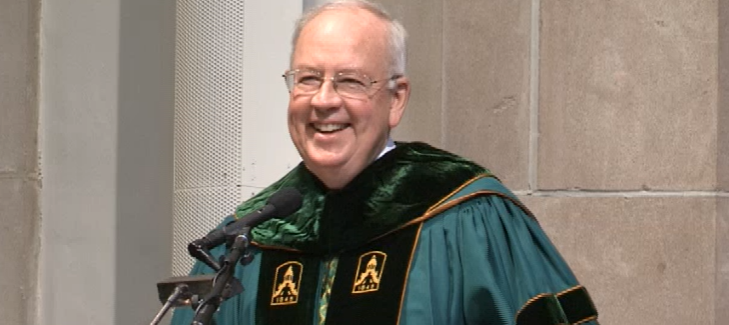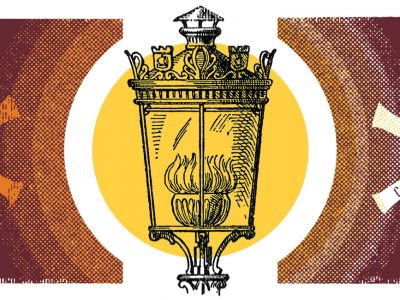
Note: The Honorable Kenneth Starr, then president of Baylor University, reflects on faith. This speech was given at Grove City College, in Harbison Chapel, for the inauguration of The Honorable Paul J. McNulty ’80 on March 23, 2015. The video of this talk, and the inauguration, can be viewed by clicking here.
What a beautiful chapel. Harbison chapel. What lovely vespers we had last evening. Beautiful music. Marvelous prayers lifted up. Let me begin by saying, Paul and Brenda welcome to your home. Welcome home.
I’ve been asked to reflect for these few minutes on faith: one of the founding principles and one of the unifying principles of your life together in this community. Faith of our fathers as the great hymn has it. From its beginning in 1876 until this happy day, the inauguration of this good friend and my former colleague Paul McNulty, Grove City College has stood as a fierce and determined champion of belief, of faith, and the freedom of the human spirit.
The Apostle Paul wrote this to the churches in Galatia, “For freedom, Christ has set us free.” Notice the connection. Faith in Christ and freedom.
At its best, a college or a university is a beacon illuminating the darkness. A college’s very existence is symbolic of a commitment to freedom of the mind. An emancipation from the shackles of ignorance. It embodies the spirit of Article 18 of the Universal Declaration of Human Rights. In a highly secular world these are very important words: Everyone has the right to freedom of thought, conscience, and religion.
This right includes freedom to change his religion or belief. And freedom, either alone or in community with others and in public or private, to manifest his religion or belief in teaching, practice, worship and observance. Please let the record show, freedom of faith is not limited to freedom of worship.
From the founding of Harvard in 1636, America’s story for so long was one of the principles of faith and freedom. Serving not only the church broadly defined but also by institutes of higher education.
In the 18th century, America’s founding generation understood this well regardless of their own belief system as individuals. Hear the words of the Northwest Ordinance of 1787 that was first passed by the Continental Congress under the Articles and then re-passed early on in 1789 by the first Congress sitting in New York and signed into law by no lesser light that General Washington. The words of the Northwest Ordinance, “Religion, morality, and knowledge being necessary to good government and the happiness of mankind, schools and the means of education shall forever be encouraged.”
That’s still found in the United States code.
Mr. Adams at Harvard. Mr. Madison at Princeton. Colonel Hamilton at Columbia. Virtually all of America’s colleges of that era were deeply religious in nature. Everyone knows Harvard’s motto: Veritas. But at the founding and for its first two centuries, the motto was actually: Veritas Christo et Ecclesiae. Truth for Christ and the Church. Likewise, Yale’s original mottos: Lux et Veritas, Light and Truth, echoed similar Christian sentiment. Christian higher education, in short, was the order of the day in early America. Indeed, the first public institution of American higher education did not open its doors until quite late in the 18th century.
Those founding generations not only left us an enduring framework of government under America’s Constitution, but they left us—by their examples and by their early laws—a tie that binds the encouragement of higher education to the vibrant American culture of freedom and faith. That generation envisioned the expansion of our vast republic. As Mr. Madison called it, “the vast commercial republic from sea to shining sea.”
But especially through the means of education on the unfolding democratic conversation—the expanding conversation—and of course through the tragic shedding of blood in the Civil War. The reality of freedom was no longer looking into the mirror darkly, to borrow from the Apostle Paul in his letter to the church in Corinth.
Even with post-Civil War fits and starts, freedom was becoming ever increasingly the norm in America. Mr. Lincoln’s Gettysburg vision of a new birth of freedom was becoming a reality. And so how appropriate that Dr. King chose the steps of Mr. Lincoln’s memorial to deliver his mighty speech about a dream. The dream brought faith squarely into the conversation about basic human rights.
Colleges and universities, as well as our churches, have played an integral role in America’s story of faith and freedom.
The institution where I am privileged and blessed to serve—Baylor—is part of that large narrative. Founded by a judge, Judge Baylor, it is part of that narrative because this judge and former member of Congress from Alabama and a great patriot who saw the shedding of blood in the War of 1812. And he, along with two Baptist pastors, one from New England educated at Brown University and one educated from Mercer in Georgia, the westward movement of founding a Christian university. Baylor embodied, and the independent Republic of Texas, the same spirit that was animating the founders of Harvard two centuries before.
Listen to these words from the founding generation of Harvard:
After God had carried us safe to New England and we had built our houses, provided necessities for our livelihood, reared convenient places for God’s worship, and led the civil government one of the next things we longed for and looked after was to advance learning and to perpetuate it to posterity. It pleased God to stir up the heart of one Mr. Harvard—a godly gentleman and a lover of learning among us—to give one half of his estate toward the founding of a college.
That is the story as well of Grove City College. The lifelong work of the Pew family and of the great Isaac Ketler. Those founders had a great dream to develop a Christian institution that would proclaim Christ. To this very day of Paul’s inauguration, Grove City College stands as a very well-known nationally and internationally beacon for America’s first freedom. Freedom of religion and liberty of conscience. Congress shall make no law respecting an establishment of religion or prohibiting the free exercise thereof. Liberty of Conscience which unites us all today.
And so, Paul, may that light continue to shine deeply into the 21st century. Its an important undertaking, especially now.
As I close, let me note rather pessimistically, that late in the 20th century James Burtchaell wrote a troubling book titled “The Dying of the Light.” The book chronicles—in 870 pages—the disengagement of so many American colleges from their founding churches and Christian missions.
That is what we are fighting.
In a stark contrast, the light here at Grove City College continues to shine very brightly. And by God’s grace and under Paul’s inspired leadership of humility the light will shine even brighter.



